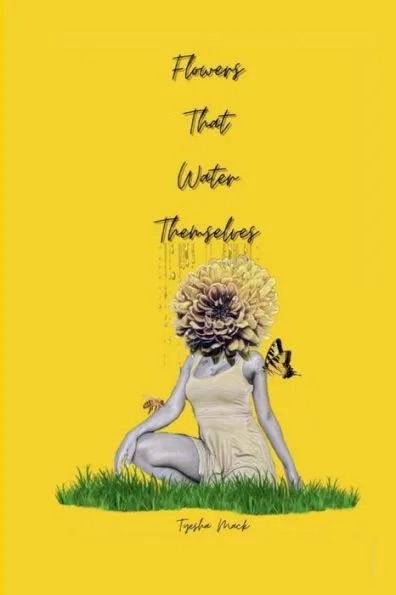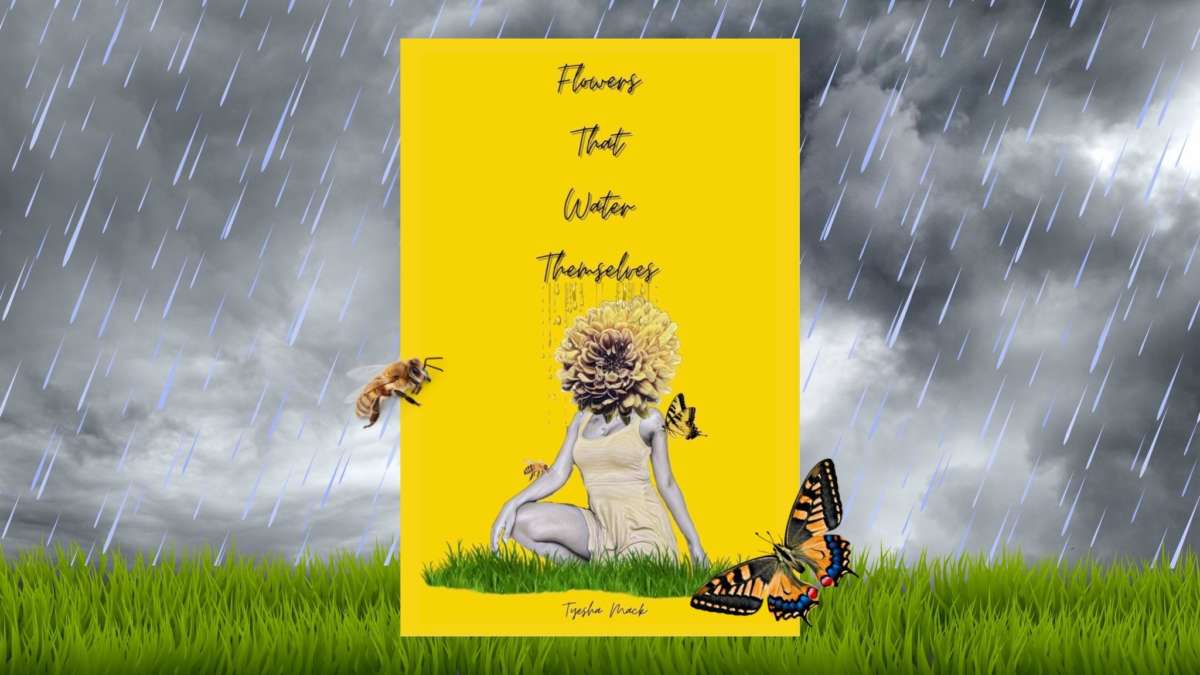Flowers that Water Themselves by Tyesha Mack
“Bloom where you’re planted,” goes a common saying. For poet and writer Tyesha Mack, that sentiment seems to miss the center of the target. “Grow and remain rooted in who you are,” she writes. “That’s what flowers do.” See the difference? It is only one of many moments of profound insight revealed throughout Mack’s poetry and prose in her debut collection, Flowers That Water Themselves: Poems and Short Stories for Healing and Self Love.
In a series of thematic sections, Mack leads us on a tour of her life — the traumas of her formative years, the wrong turns of her early 20s, crippling bouts of anxiety and doubt, her gradual transformation and healing as she approaches her 30th trip around the sun, and her hopes for her future. In this way, Flowers That Water Themselves is structured roughly chronologically, taking us through the self-consciousness and bullying of her childhood, into the magic and heartbreak of first love, ever deeper into damaging and abusive relationships, and eventually into spiritual awakening, healing and finding truer forms of love, including that of the self.
The works in the book cycle through different forms: poems, short personal essays, aphorisms (or “Honeyisms,” which nod to the author’s Twitter handle, @HoneyThePoet_), notes of explanation and encouragement to the reader, and the occasional “angel number” message (a numerology concept in which it is believed angels communicate to us through specific, and often recurring, numbers). Together, these pieces form a mosaic of experience, emotion, thought and insight that make this book difficult to shelve in any one category. An argument can even be made for it as a self-help guide.
A BLUEPRINT FOR GROWTH WRAPPED IN POETRY AND PROSE
Which isn’t far from the intent, as it turns out. “I want to tell you how I grew from all that tried to defeat me; how I flourished and watered myself until I budded into something special,” Mack writes in the introduction to the book. “… I want to tell you about these things in hopes you are inspired to water yourself too; in hopes that my journey helps you.” By dissecting her own life experiences and showing us how she was able to “raise her vibration” to one of self-love and acceptance, we as readers can see the path more clearly in our own lives.
Of particular importance to Mack is supporting the self-esteem of women of color, and some of the finest examples of her writing are in her depictions of the Black experience, whether it be of celebration and pride (“Your skin is not a stain / The melanin alone is a rite of passage, child / You hold power in your pigment / The gold and glitter that is black skin is your magic.”) or the emotional toll of systemic racism (“How long do we have to fear being feared? / When will there be justice so we can live in peace? / When will brown bodies stop paving city streets? / We are tired.”).
One particularly stellar poem in the collection is in response to Maya Angelou’s I Know Why the Caged Bird Sings: “I know why the caged bird sings, too / … He sings because not only did they lock him in there / He imprisoned himself … / He sings because he thinks it’s all he’s got / That’s all belong to him, his voice / … It gives him hope / Hope he may not feel right away but inspires others / Dreams that one day we all can be free / … He sings because like our ancestors before us he uses the melody to lead us to a land of promise.”
Mack’s poetry is accessible in its clarity, whether in more straightforward confessional passages or in more metaphorical or imagistic ones (such as this: “The fact of the matter is, I’ve outgrown you and your cycles. / My spirit follows the Moon now … not humans. / Sometimes I am full. / Other times not so much. / But 100 percent of the time I shine. / … You are no longer my source of gravity. / I am never to be drawn in again.”) As such, Flowers That Water Themselves will have appeal to readers who may not otherwise feel like they “get” poetry. To the contrary, many readers may feel Mack gets them, in all their struggles, heartaches, hopes and dreams.
Ultimately, it is Mack’s wisdom that shines brightest through these pages — not only has she transformed tormented passages of her past into art, but she has also crystallized the lessons therein for us to reflect on. There is much here to help us find the path to a happier, more fulfilled life — while remaining true to who we really are.




